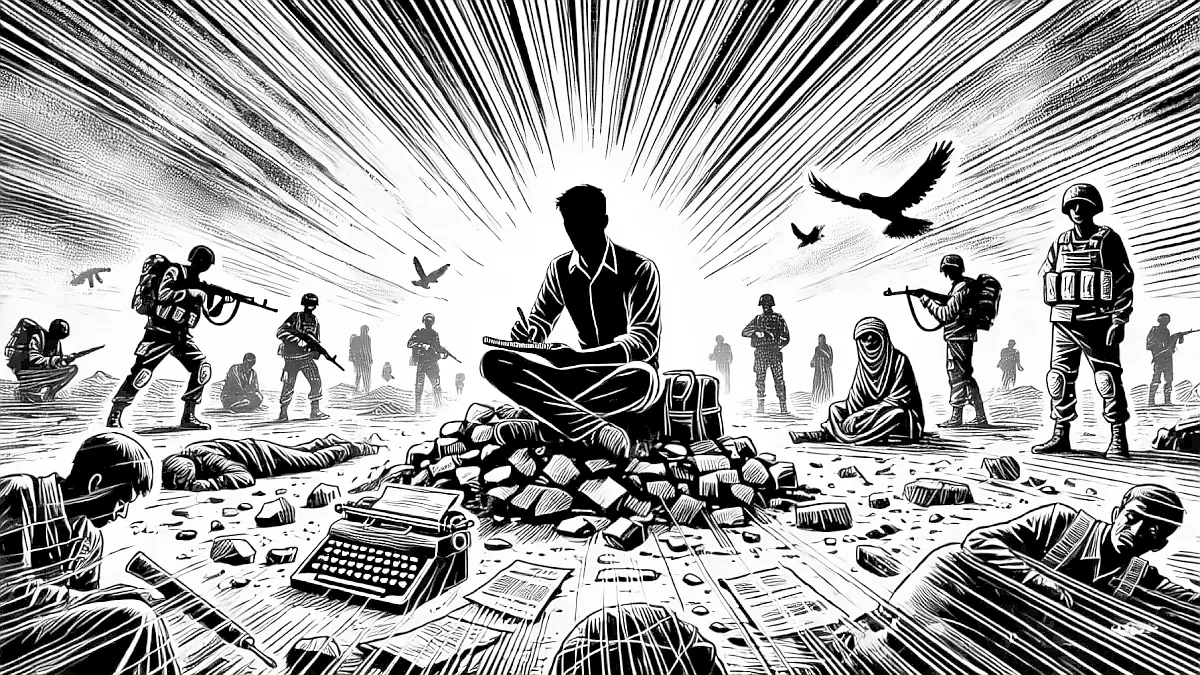 illustration: DALL-E
illustration: DALL-EIn her insightful commentary on Igor Borkowski’s article "Reporter na wojnie. Nowe dylematy zawodu dziennikarskiego w obliczu konfliktów zbrojnych", Marta Danowska-Kisiel from SWPS University unpacks the profound transformation of Polish war journalism following Russia’s invasion of Ukraine in 2022. Her summary sheds light on the shifting professional, ethical, and emotional landscape that shapes contemporary war correspondence.
The analysis revolves around Borkowski’s study of war coverage in two respected Polish weeklies, Polityka and Tygodnik Powszechny, focusing on how journalists navigate the complex task of reporting a brutal conflict close to home while preserving professional standards.
Rethinking journalistic responsibility
Borkowski, as Danowska-Kisiel notes, emphasizes the renewed urgency of ethical decision-making for war reporters. The journalist must constantly ask: What should be shown, and from whose perspective? These questions, old as journalism itself, take on fresh gravity when war unfolds just across the border. The need to protect sources, avoid compromising military operations, and remain emotionally detached clashes with the urgency to bear witness and humanize the war experience.
The article argues that Polish media were initially unprepared for the demands of frontline reporting. This gap led to improvisations such as anonymizing data and obscuring tactical details in reports to avoid aiding the enemy-while still striving to maintain narrative clarity and trust with the audience.
New techniques, same purpose
According to Danowska-Kisiel, Borkowski highlights the tension between credibility and caution. Reporters now deliberately omit exact names, locations, and technical specifics. Some change the names of protagonists or avoid disclosing their own positions. In one example, a correspondent mentions "some kind of weapon" without further details-enough to suggest danger, but vague enough to maintain operational security.
Interestingly, these anonymous practices coexist with strategies to reinforce authenticity. Reporters describe their physical presence, past experience in Ukraine, and interactions on the ground to validate their authority. However, first-person narration is still rare. Borkowski interprets this as a deliberate decision to avoid centering the reporter’s ego and instead prioritize analysis over immersion.
Psychological burden of witnessing
Danowska-Kisiel also draws attention to the mental health toll of this work. One poignant quote from Paweł Pieniążek in Tygodnik Powszechny sums it up: “Some leave the front, but the front doesn’t leave them.” This suggests that exposure to war-even with emotional detachment-leaves lasting scars. Despite a professional commitment to distance and objectivity, journalists inevitably absorb the trauma of what they witness.
In one particularly moving example discussed in Borkowski’s article, Paweł Reszka withholds tragic information from a source, raising the haunting question: Should I tell him? Such moments reveal the tragic dimension of the war correspondent’s role-caught between truth-telling and compassion.
Journalism reimagined
Danowska-Kisiel shows that Borkowski ultimately sees today’s war reporter not as a neutral observer, but as someone actively shaping the narrative. They must balance factual precision with human insight, while constantly renegotiating their professional identity. No longer just messengers, they become ethical actors on a volatile stage.
The article concludes with a reflection on continuity and change. While war reporting still grapples with timeless dilemmas, modern conflicts have made these debates more immediate and visible. Thanks to digital tools and fast-paced publishing cycles, the ethical choices of reporters are now transparent-and so are their consequences.
COMMERCIAL BREAK
New articles in section Skills and knowledge
A heuristic trap in media coverage. How loud headlines boost fear
Bartłomiej Dwornik
A negative message that rests on emotion lifts the sense of threat by 57%. Why do reports of a plane crash drive investors away from airline shares? Why do flood stories spark worry about the next deluge? The pattern is irrational yet clear and proven.
How LLMs are reshaping SEO. Smart content strategies for the age of AI
BDw
For years, SEO was a fairly predictable game. Pick the right keywords, optimize your content, and watch your website climb the rankings. But today, a silent revolution is underway - and it`s being led by large language models (LLMs) like ChatGPT, Claude, Gemini, and DeepSeek.
Chronemics, or The Language of Time. What Your Watch Says About You
Bartłomiej Dwornik
You walk in on time, glance at your watch, wait five minutes, then leave. Someone else is thirty minutes late and acts like they had to wait for you. Time in communication is a tool, a weapon, and a status marker. Welcome to the world of chronemics. The study of how time affects human relationships.
See articles on a similar topic:
Sarcasm in Communication. A Study by INSEAD Researchers
Krzysztof Fiedorek
Sarcasm can be a valuable tool in interpersonal communication, but its effectiveness depends on the context and the relationship between the sender and the receiver. Researchers at INSEAD have shown that well-utilized sarcasm can be a powerful asset in business language and advertising.
AI slops and microtargeting. Why wou should NOT LIKE the bread horse
Bartłomiej Dwornik
"I grew this garlic chive all by myself on the windowsill. But I bet you won't congratulate me." Do you also see an influx of such posts in online communities? Be careful. This is called AI slop (or Boomer Trap), and it is NOT just a harmless game or entertainment. It is a well-thought-out mechanism in which the currency is you. First, your time and engagement. And soon, your money.
Betteridge's Law. Is every headline with a question mark a gimmick?
Krzysztof Fiedorek
Betteridge's Law is a journalism hypothesis suggesting that any headline ending with a question mark can be answered with “no.” This rule applies to yes-or-no questions. It wasn’t actually created by Ian Betteridge and… it’s mostly untrue.
Readability: Tools for Journalists to Enhance Text Clarity
Bartłomiej Dwornik
Even the most substantive content must be presented in an accessible and visually appealing way. First, so the reader can understand it. Second, to be easy on the eyes. In both cases, machines can help. Here are some tools for measuring text readability that every journalist might find useful.





























